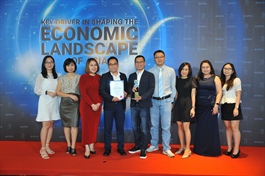The core factors for business success in Vietnam
The core factors for business success in Vietnam
Vietnam is a very interesting story about a rapidly developing economy. Truong Bui, partner at Roland Berger Vietnam, spoke to VIR’s Bich Ngoc about how top-tier strategy consultants support Vietnamese businesses in navigating a changing world.
What is your vision of the current state of socioeconomic development in Vietnam?
Extensive reform and integration into the global economy since the 1980s has rapidly helped Vietnam grow from a low to middle-income country in just two decades, with a forecast of becoming a high-income country by 2045.
Despite the global economic context being strongly affected by the pandemic, Vietnam has a strong recovery with forecasted GDP of 7 per cent and continues to be one of Southeast Asia’s largest economies.
I would translate the views of Vietnamese business policymakers here who wish that recovery for businesses and the economy after the pandemic is not a return to the old state but to a new look, new business models, innovations, digital transformation, and sustainable development.
The business sector generates over 60 per cent of Vietnam’s GDP and plays an important role in the country’s socioeconomic growth and development. However, businesses today face a double challenge. On the one hand, companies have had to deal with issues that require urgent action in the face of a crisis, like the pandemic, that could even threaten their very existence.
On the other hand, they see a greater degree of uncertainty than they experienced before. Vietnam is an economy that is heavily dependent on the import-export market, so businesses are even more affected by fluctuations across the global market.
However, the volatile context always brings opportunities. This is a good time for businesses to restructure and reshape growth strategies. Vietnamese companies are trying to catch up with new business trends, craft scenarios to adapt to changes, actively implement digital transformation, and use technology to improve productivity and quality.
As a top strategic consulting organisation, what can you do to help businesses accelerate recovery in an uncertain context?
To succeed in a changing world, businesses here will need a new institution that focuses on increasing foresight and sensing changes. To create that business institution we need robust organisational governance, a holistic approach that we created at Roland Berger based on deep academic insights, industry practice, and consulting experience.
It is a comprehensive approach that has six different dimensions that help organisations to assess their current capacity, identifying specific priorities for future development. Those dimensions are community ideals, strategy and culture, leadership philosophy and talent management, financial and investment management, managing processes and dynamic factors, business ecosystems and networks, and technology and data governance.
The exploitation of technology has become a core factor for success. What examples of this can Roland Berger assist in?
The fact that businesses need to invest in, capture, and control disruptive innovations in technology is not new. Looking out to the world, global pioneers have taken this boldly.
For example, Nestlé’s digital transformation strategy, Vision2Life, is purposefully designed to leverage digital technology to support internal and external growth. On the Asian side, Meituan of China has been implementing a driverless delivery vehicle project since 2016 and started operating a fleet of hundreds of test vehicles, reaching more than 100,000 orders by 2021.
Roland Berger’s approach to technology adoption describes not only what they are but, more importantly, how to build. Vietnamese businesses can maximise the impact of technology by focusing on people, budgeting, partnerships, and monitoring.
Technology often accompanies innovation and new value propositions. So how do you assess Vietnamese businesses from this perspective?
Innovation is the driving force for the competitive advantage and development of businesses, while technology helps those innovations come to life in a more optimal way.
However, it must be admitted that the capacity for research and development (R&D) and innovation is not high, meaning investment is not significant from the business side.
A developing economy such as Vietnam is characterised by shorter-term investment channels and faster recovery in comparison to R&D or capital investment. This is not a small challenge for Vietnam. But on a positive note, I see more and more big businesses investing in long-term projects and hopefully, we can pick up this momentum. Vietnamese business can leverage the way that Singaporean business does when working with global brands in open innovation projects.
The environment is full of uncertainty. What should Vietnamese enterprises do specifically in this regard?
I would suggest focusing on four main things. Businesses must move fast, gather sufficient information, and decide quickly which opportunities to pursue. They must build up a growth engine to use a successful pattern to enter new markets.
In addition, strategies should be diversified by carefully selecting some opportunities to take a giant leap and others to do a step-by-step approach and get returns on the way. The final factor is reacting quickly in case circumstances change, ensuring flexibility to deviate from the planned course.
Having proved our expertise in the most challenging times, we know how to help businesses strengthen their ability to navigate post-pandemic difficulties with our profound global experience.


























